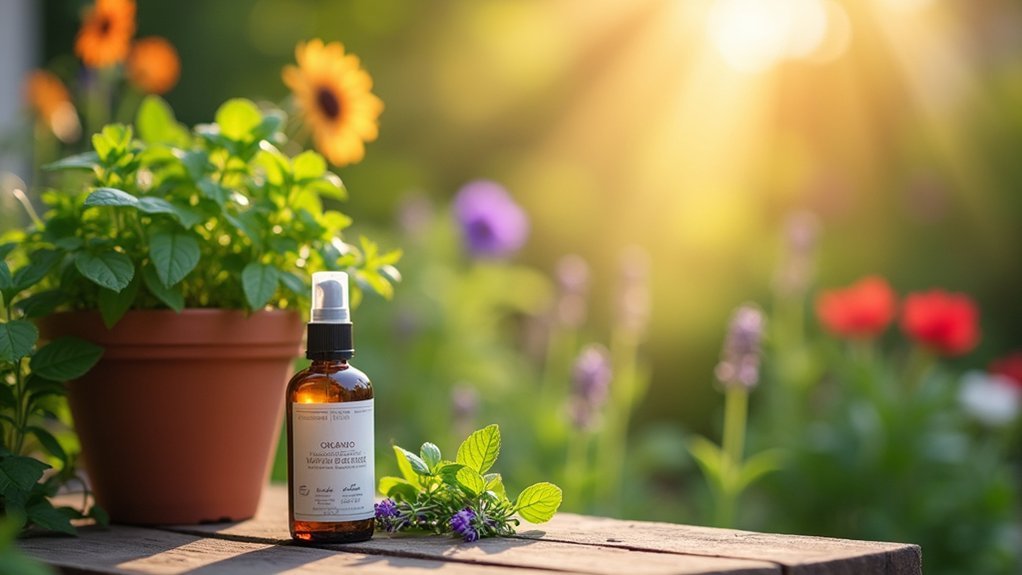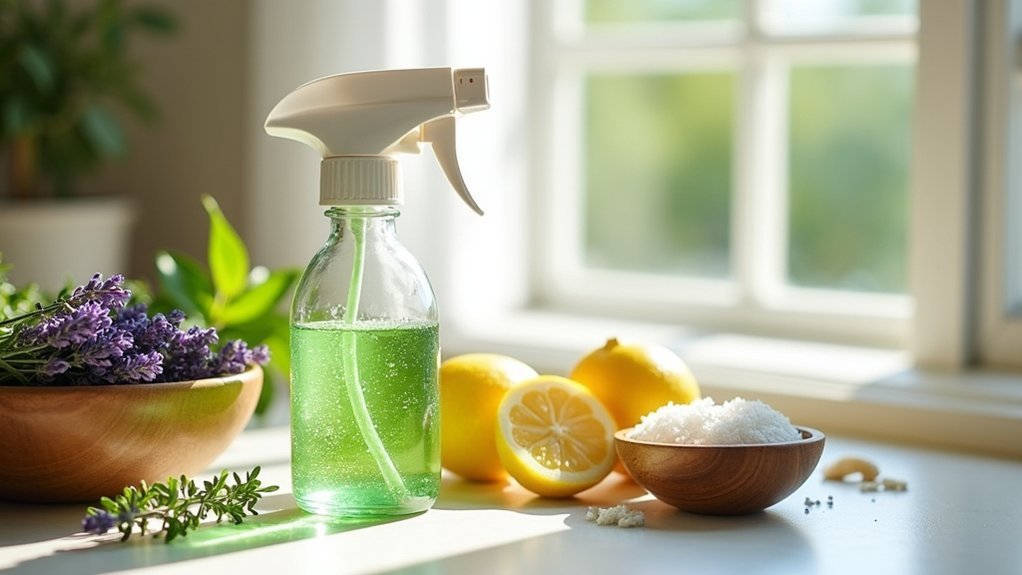For pet-safe mosquito control, use cedar oil, soybean oil, or properly diluted peppermint oil sprays instead of toxic DEET or permethrin products. Plant natural barriers like marigolds, lavender, and lemon balm in your yard. Remove standing water to prevent breeding, and consider BTI mosquito dunks for water features. Commercial options like Tick Killz provide up to four weeks of protection without harming pets or beneficial insects. The following strategies will help you create a thorough defense system against mosquitoes.
Understanding the Dangers of Chemical Repellents for Pets

Why risk your pet’s health with chemical mosquito repellents when safer alternatives exist? Common repellents containing DEET can trigger severe neurological problems in your pets, including seizures and tremors that may prove fatal.
Products with pyrethrin and permethrin are especially dangerous for cats, causing symptoms from excessive drooling to respiratory failure.
Pyrethrin and permethrin products pose a severe threat to feline health, with effects ranging from harmless drooling to deadly respiratory collapse.
Even citrus-based repellents with d-Limonene can irritate your pet’s skin and cause digestive distress if ingested.
Traditional pesticides like chlorpyrifos and malathion create both immediate poisoning risks and long-term health concerns.
Remember that residual chemicals remain active after application, continuing to threaten your pet’s wellbeing.
When seeking pet-safe mosquito control, always prioritize organic solutions that effectively repel insects without endangering your furry family members.
Essential Oil Solutions: What Works and What to Avoid
Cedar oil stands out as a powerful pet-safe mosquito repellent, while other options like geranium and soybean oils offer varying levels of effectiveness without harming your furry companions.
You’ll find numerous commercial products containing these safer oils, but you can also create your own DIY spray by mixing pet-safe essential oils with water and a small amount of witch hazel.
When making your own solutions, always remember to dilute properly and test on a small area of your pet’s coat first, avoiding toxic ingredients like citrus oil derivatives that could cause health issues if ingested or absorbed.
Cedar Oil’s Mosquito Defense
Among the most promising organic mosquito control options for pet owners, cedar oil stands out for its remarkable effectiveness and safety profile.
This natural mosquito repellent targets not just mosquitoes but also ticks and fleas, making it a versatile addition to your pest control arsenal.
Unlike DEET and other synthetic chemicals, you won’t need to worry about toxicity risks when your pets explore treated areas.
Cedar oil’s pleasant fragrance repels pests while remaining gentle on beneficial insects that support your garden’s ecosystem.
You’ll find cedar oil in convenient forms including sprays and diffusers, making application simple regardless of your preference.
For consistent protection, apply cedar oil products every 3-4 weeks throughout mosquito season.
This regular maintenance will greatly reduce pest populations around your home without compromising your family’s health.
Popular Oils Compared
When comparing essential oils for mosquito control, pet owners face a critical challenge: finding solutions that repel pests without endangering their animals. Not all natural repellents are created equal when it comes to pet safety.
- Safe Options: Lemon eucalyptus oil serves as an effective DEET alternative for humans, while small amounts of geranium and soybean oils can be used around most pets for mosquito control.
- Approach with Caution: Peppermint oil offers excellent repellent properties with a pleasant scent, but always dilute properly and consult your veterinarian before use.
- Avoid Entirely: Citronella and some geranium oils repel mosquitoes effectively but are toxic to pets, making them unsuitable for pet-friendly essential oils applications.
Always check with your vet before introducing any oils to your pet’s environment.
DIY Oil Spray Recipes
Creating your own mosquito repellent spray offers a balance between effectiveness and pet safety, provided you select the right ingredients.
For a basic DIY oil spray recipe, combine 10-15 drops of pet-friendly essential oil with 2 cups of water in a spray bottle and shake thoroughly before each use.
Consider using lemon eucalyptus, lavender, or peppermint for effective mosquito repellents, but always keep these formulations away from your pets’ direct contact.
For households with cats and dogs, rosemary and cedarwood oils make safer alternatives that can be applied to pet collars or sprayed in your yard.
Never use citrus oil derivatives like d-Limonene or linalool in your DIY mosquito repellents, as these are highly toxic to pets.
Always consult your veterinarian before introducing any essential oil products around your animals.
Natural Plant Barriers: Creating a Mosquito-Free Zone
While chemical repellents may harm your pets, strategic planting can transform your yard into a natural mosquito deterrent.
Creating biodiversity with mosquito-repelling plants offers a beautiful, pet-safe solution for your outdoor spaces. Herbs like basil and rosemary serve as effective natural insect barriers while requiring minimal maintenance.
Consider these mosquito repellent for yards options:
- Plant marigolds containing pyrethrum to create vibrant borders that naturally repel mosquitoes.
- Establish lavender patches that deter pests while attracting beneficial pollinators.
- Incorporate lemon balm in high-traffic areas for immediate protection when brushed against.
These plant barriers work together to create an all-encompassing defense system, greatly reducing mosquito populations while enhancing your landscape’s appeal—a win-win for both your family and your four-legged companions.
DIY Pet-Safe Spray Recipes You Can Make Today

Three simple ingredients are all you need to make effective mosquito repellents that won’t harm your pets.
Mix 10 drops of lemon eucalyptus essential oil with two cups of water in a spray bottle for an instant natural mosquito repellent that’s safe to use around your furry friends.
For a citrus-based alternative, combine fresh squeezed lemon juice with water and gently rub it onto your pet’s coat. The mosquitoes hate it, but your pets won’t mind!
Create a rosemary-infused spray by boiling fresh leaves and cooling the mixture before application.
Or blend witch hazel with lavender or peppermint essential oils for a powerful DIY pet-safe spray that keeps the biters at bay.
Plant basil, lemon balm, and marigolds for additional protection that complements your homemade solutions.
Pet-Friendly Yard Treatments That Target Mosquitoes
Keeping your yard mosquito-free doesn’t require harsh chemicals that endanger your pets. Effective natural solutions like organic mosquito sprays with cedarwood and peppermint oils offer powerful protection while ensuring your furry friends can safely explore the outdoors.
These pet-friendly yard treatments deliver impressive coverage—up to 10,000 square feet per 8 oz. bottle—and target both adult mosquitoes and larvae.
For maximum effectiveness:
- Reapply organic treatments every 3-4 weeks to maintain mosquito protection
- Plant natural repellents like basil and lavender throughout your garden
- Choose formulations that protect beneficial insects like honeybees and butterflies
Breaking the Mosquito Life Cycle Without Harmful Chemicals

Understanding the mosquito life cycle provides the foundation for effective, chemical-free pest management that keeps your pets safe. By implementing IPM techniques, you’ll disrupt breeding patterns while avoiding toxic substances that harm your furry friends.
| Natural Strategy | Mosquito Control Benefit |
|---|---|
| Remove standing water | Eliminates larval development sites |
| Plant basil, marigolds | Creates natural repellent barriers |
| Apply BTI dunks | Targets larvae safely in water features |
| Maintain clean yard | Reduces mosquito harborage areas |
Strategic landscaping with mosquito-repelling plants creates a physical and aromatic barrier that deters these pests. For existing water features, BTI mosquito dunks provide targeted control without harming beneficial insects or pets. Regular application of organic sprays containing cedarwood or rosemary oil offers residual protection while maintaining a pet-friendly environment.
Organic Commercial Products Worth Your Investment
You’ll find significant value in products like the Lawn Care Pest Control Spray, which covers 10,000 square feet with its DEET-free formula featuring a pleasant cedar scent.
Tick Killz offers another excellent option, using all-natural ingredients to provide up to four weeks of protection while remaining safe for pets and beneficial insects.
These organic solutions represent the best commercial investments for mosquito control, combining effective active ingredients with eco-friendly formulations that won’t harm your family or the environment.
Top Product Recommendations
When your pet’s safety is non-negotiable yet mosquitoes make outdoor time miserable, organic commercial repellents offer the perfect solution.
Our top picks deliver effective mosquito control without harmful chemicals.
Tick Killz stands out with its 100% natural formulation that provides up to four weeks of protection against multiple pests while remaining pet safe.
For aromatic options that work beautifully:
- Wondercide – Harnesses cedarwood and sesame oils for powerful yet eco-friendly mosquito control
- Vets Best – Combines peppermint and clove oils for pleasant-smelling yard protection
- Eco Defense – Features cinnamon, cedarwood, and clove oils that repel mosquitoes while protecting beneficial insects
For stubborn mosquito problems, consider Mosquito Magician with its potent lemongrass and garlic oil blend that effectively deters pests while maintaining environmental safety.
Effective Active Ingredients
Behind the effectiveness of top pet-safe mosquito repellents lies a carefully selected mix of natural active ingredients that pack a serious punch.
These formulations harness the power of essential oils that mosquitoes find repulsive while remaining gentle on your pets.
Cedarwood and sesame oils in Wondercide create a powerful barrier against pests without harming beneficial insects.
Vets Best combines peppermint and clove oils for dual-action against mosquitoes and fleas.
If you’re looking for immediate results, Eco Defense’s blend of sodium lauryl sulfate with cinnamon and clove oils delivers quick knockdown effects.
For longer-lasting protection, consider MDX Concepts with its rosemary and spearmint oils, or Tick Killz, which offers up to four weeks of residual protection using 100% natural active ingredients that are completely pet safe.
Beyond Sprays: Alternative Mosquito Control Methods

While sprays offer quick solutions for mosquito problems, a more extensive approach to pest control can protect your pets without harmful chemicals.
Implementing a thorough pet-safe mosquito control strategy creates multiple defense layers around your home.
Consider these natural alternatives:
- Create a botanical barrier with mosquito-repelling plants like lavender, basil, and rosemary that beautify your garden while deterring pests.
- Install mosquito traps or zappers in strategic locations to reduce populations without risking your pets’ health.
- Encourage natural predators by providing habitats for mosquito-eating birds and bats.
Don’t forget to remove standing water where mosquitoes breed.
Diffusing pet-safe essential oils like lemon eucalyptus can also create a pleasant atmosphere while keeping these pests at bay.
These integrated approaches work together for effective, chemical-free protection.
Integrated Pest Management for Long-Term Protection
Although quick fixes may temporarily solve your mosquito problems, Integrated Pest Management (IPM) offers a thorough, sustainable approach that protects your pets for seasons to come. This strategy combines multiple control methods rather than relying solely on chemicals.
Start by eliminating standing water in your yard—empty birdbaths, flower pot saucers, and pet bowls regularly.
Next, establish a monitoring routine to track mosquito activity, applying treatments only when necessary.
Encourage natural predators like birds and beneficial insects to visit your garden, as they’ll help control mosquito populations naturally.
When chemical intervention is needed, choose pet-safe products containing essential oils rather than harsh pesticides.
Frequently Asked Questions
What Kills Mosquitoes but Is Safe for Pets?
You can use organic sprays with cedarwood, peppermint, clove, or rosemary oils to kill mosquitoes safely around pets. Plant basil and lemon balm in your garden for additional protection. Reapply solutions every 3-4 weeks.
What Is the Best Natural Mosquito Repellent for Dogs?
You’ll find lemon eucalyptus oil is the best natural mosquito repellent for dogs. Peppermint, cedarwood, and clove oils also work effectively. Always dilute these essential oils properly and consult your vet before application.
Is There a Natural Mosquito Repellent That Actually Works?
Yes, natural mosquito repellents do work. You’ll find effective options containing citronella, lemon eucalyptus, and cedarwood oils. These provide protection for hours, and when regularly reapplied, they’ll greatly reduce mosquito encounters around your home.
How Do You Kill Mosquito Larvae Without Harming Pets?
You can kill mosquito larvae using Bti (mosquito dunks), beneficial nematodes, or simply emptying standing water regularly. These methods effectively target larvae while remaining completely safe for your pets and other wildlife.
In Summary
You’ve now got a complete toolkit for keeping mosquitoes away from your pets naturally. By choosing organic solutions, creating protective barriers, and breaking the mosquito life cycle, you’re protecting your furry friends without harmful chemicals. Remember, consistency is key with natural methods. Combine several approaches for the best results, and you’ll enjoy a safer, more comfortable outdoor experience with your pets all season long.





Leave a Reply